|
NIH global health research newsletter, with articles on a new fellowship program bringing African scientists to train at NIH, how mentorship training in LMICs needs increased support, the 2018 Women Leaders in Global Health conference, and more.

|
|
January / February 2019 |
|
The African Postdoctoral Training Initiative, a new NIH fellowship program, aims to prepare future generations of African researchers while establishing ongoing scientific partnerships between NIH labs and African investigators and institutions. The program is a collaboration of the NIH, the African Academy of Sciences, and the Bill and Melinda Gates Foundation.
>> Full article
|
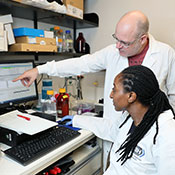 |
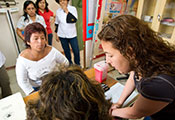 |
Participants at the 2018 Women Leaders in Global Health conference explored and discussed barriers to progress for women, who hold less than a quarter of global health leadership positions.
>> Full article
|
|
Dr. Omar Siddiqi, a former Fogarty Fellow who helped launch Zambia’s first neurology research training program, discusses Fogarty's impact on his career, the influence of mentorship, and his goals for neurology in Zambia.
>> Full article
|
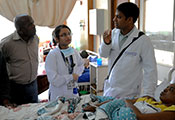 |
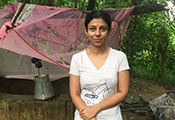 |
Dr. Shuchi Anand studied prevalence and risk factors for chronic kidney disease (CKD) as a Fogarty Fellow. Her fellowship segued into an NIH career development grant that allowed her to expand upon her work in India.
>> Full article
|
|
According to a new supplement to the American Journal of Tropical Medicine and Hygiene, mentorship training must be expanded and given more institutional support in low- and middle-income countries. Fogarty Scholars and Fellows program faculty and alumni produced the supplement to serve as a guide to encourage LMIC organizations to strengthen mentoring and institutionalize the practice.
>> Full article
|
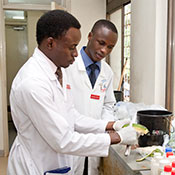 |
|
Also in this issue
Failure can teach valuable lessons, lead to opportunities
Opinion by Fogarty Director Dr Roger I Glass
Dr. Glass joined a panel of his peers at the American Society of Tropical Medicine and Hygiene annual meeting to provide unfiltered reflection on the importance of learning from failure - how to recover, apply the lessons learned and figure out how to move on in a positive way from the unexpected results.
Fogarty’s Dr Ken Bridbord celebrated for 35 years of service
The Fogarty family assembled in December to toast Dr. Ken Bridbord and pay tribute to his many contributions to global health research and training.
Global stroke risk estimates vary by geographic region
One in four people over age 25 is at risk for stroke during their lifetime, according to a new study published in The New England Journal of Medicine. People in the news:
- Nobel for Former Fogarty Scholar-in-Residence Dr. Tasuku Honjo
- Dr. Linda-Gail Bekker lauded for HIV research and human rights
- Dr. Michele De Luca recognized for scientific innovation
- NIAMS Director Dr. Stephen I. Katz mourned
- Former Fogarty advisor, NIH leader Dr. Ting-Kai Li dies
- Dr. Robert Gramzinski leading US military HIV research effort
- New role for Dr. Kate O’Brien with WHO
- International honor for NIH’s Dr. Constantine Stratakis
- Details: People in the news
Global health briefs:
- NICHD launches free Placental Atlas Tool
- African scientists face barriers, report says
- WHO says progress on malaria has stalled
- Vaccine gaps cause global measles cases to spike
- More research needed to defeat dementia
- WHO: insufficient progress on road safety
- Details: Global health briefs
E-news extras
- Fogarty and NIH grantee news
- Updates from the Center for Global Health Studies
Fogarty news, January 9, 2019
- Grantee news: University of Arizona teams building better endoscopes to detect gynecological cancers
Arizona Daily Star, December 14, 2018
- Control HIV by treating schistosomiasis, new study [supported in part by Fogarty/NIH] suggests
PLOS news via EurekAlert, December 13, 2018
- Three joint winners of $1M 2018 Al Sumait Prize for Health announced
Fogarty collaborator Rakai Health Sciences Program among recipients
Africanews, November 21, 2018
- Video: H3Africa BioNet - Pan African Bioinformatics Network for H3Africa
H3Africa BioNet via YouTube, October 2018
- NIH global health research news
- The future of minority health and health disparities research is here
NIMHD/NIH news, January 31, 2019
- NIH-supported scientists develop tool to measure success of HIV cure strategies
NIAID/NIH news, January 30, 2019
- Investigational monoclonal antibody to treat Ebola is safe in adults
NIAID/NIH news, January 25, 2019
- Temperature-stable experimental tuberculosis vaccine enters clinical testing
NIAID/NIH news, January 23, 2019
- NIH study examines how pregnancy affects drugs for HIV and TB in people living with HIV
NIAID Now blog, January 23, 2019
- Dengue immunity may be protective against symptomatic Zika, study finds
NIAID/NIH news, January 22, 2019
- For HIV, treatment is prevention
Blog post by NIH Director Dr. Francis S. Collins, January 22, 2019
- AI approach outperformed human experts in identifying cervical precancer
Algorithm could revolutionize cervical cancer screening, especially in low-resource settings
NCI/NIH news, January 10, 2019
- NIH researcher presents encouraging results for gene therapy for severe sickle cell disease
NHLBI/NIH news, December 4, 2018
- NIH statement on World AIDS Day, December 1, 2018
NIAID/NIH news, November 30, 2018
- Meeting the challenge of engaging men in HIV prevention and treatment
NIAID/NIH news, November 29, 2018
- Clinical trial of investigational Ebola treatments begins in the Democratic Republic of the Congo
NIAID/NIH news, November 27, 2018
- News and publications featuring Fogarty staff
- Other global health research news
- More global health research news from Fogarty
|
Funding opportunities
|
Upcoming events
February 12, 2019
Fogarty Advisory Board Meeting
NIH campus
Bethesda, MD
February 28, 2019
Rare Disease Day at NIH
NIH campus
Bethesda, MD
March 7 - 10, 2019
Consortium of Universities for Global Health (CUGH) Annual Global Health Conference
Chicago, IL March 14 - 15, 2019
Alzheimer's Disease-Related Dementias (ADRD) Summit
Sponsored by NIH's National Institute of Neurological Disorders and Stroke (NINDS)
NIH campus
Bethesda, MD, with free live webcast March 28 - 30, 2019
International Workshop on HIV and Hepatitis Observational Databases (IWHOD)
Athens, Greece April 8 - 9, 2019
Global Mental Health Research Without Borders
co-hosted by the National Institute of Mental Health (NIMH) Center for Global Mental Health Research
NIH campus
Bethesda, MD April 13 - 14, 2019
Global Health and Innovation Conference presented by Unite for Sight
New Haven, CT Fogarty calendar of events
Connect with Fogarty
 Fogarty on Facebook | Fogarty on Facebook |  Fogarty on Twitter | Fogarty on Twitter |  Subscribe Subscribe
|
|
Global Health Matters is produced by the Office of Communications at the National Institutes of Health's Fogarty International Center. For more information, please contact managing editor Ann Puderbaugh, at ann.puderbaugh@nih.gov or 301-496-2075.
Permission to reprint Global Health Matters content: All text produced in this newsletter is in the public domain and may be reprinted. Please credit Fogarty International Center. Images must be cleared for use with the individual sources, as indicated.
The Fogarty International Center, the international component of the U.S. National Institutes of Health, addresses global health challenges through innovative and collaborative research and training programs and supports and advances the NIH mission through international partnerships.
Subscribe, update your subscription or unsubscribe to this e-newsletter from the Fogarty International Center subscription page. We encourage you to forward this e-newsletter to colleagues who may find it of interest. |
|





